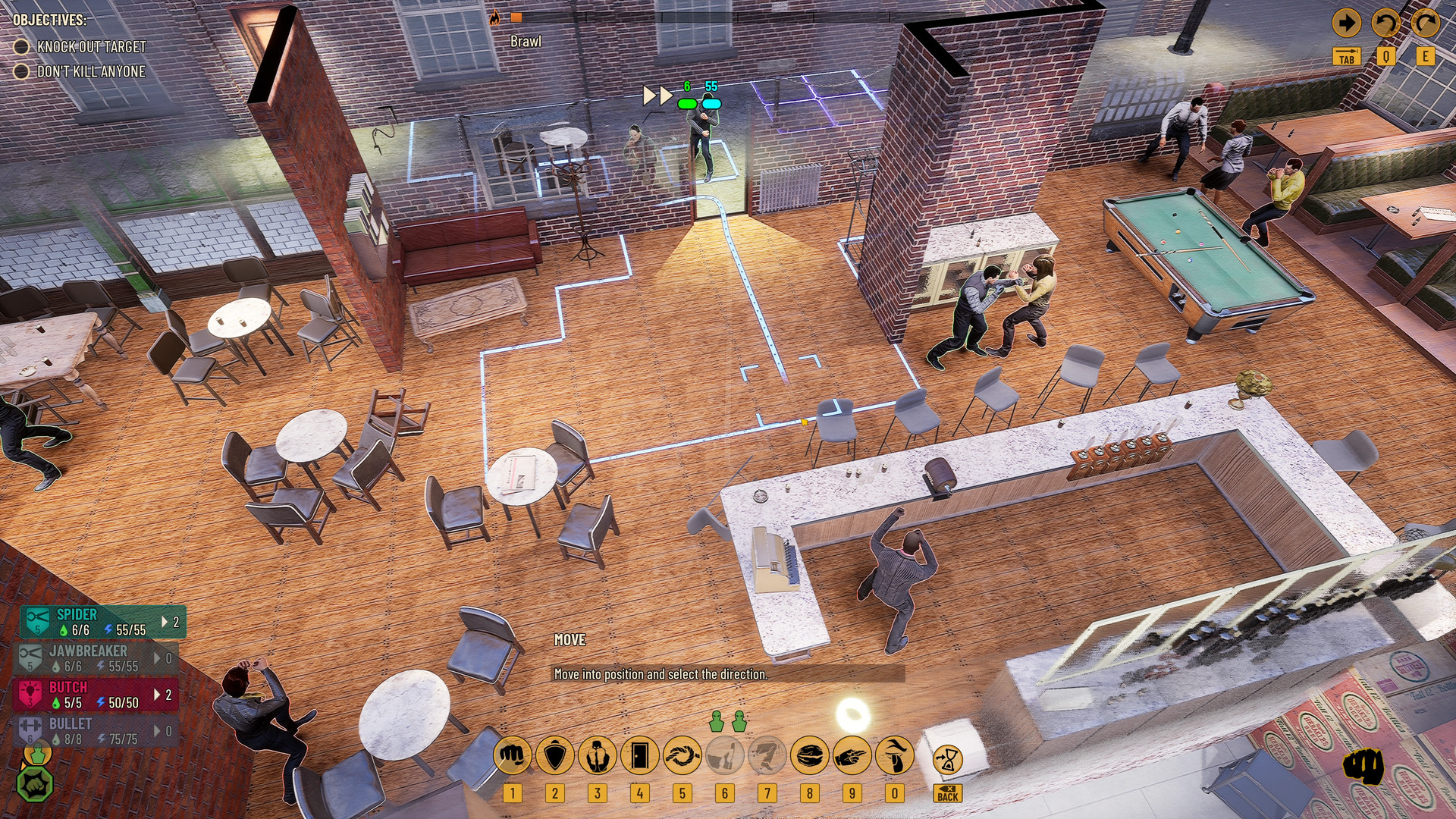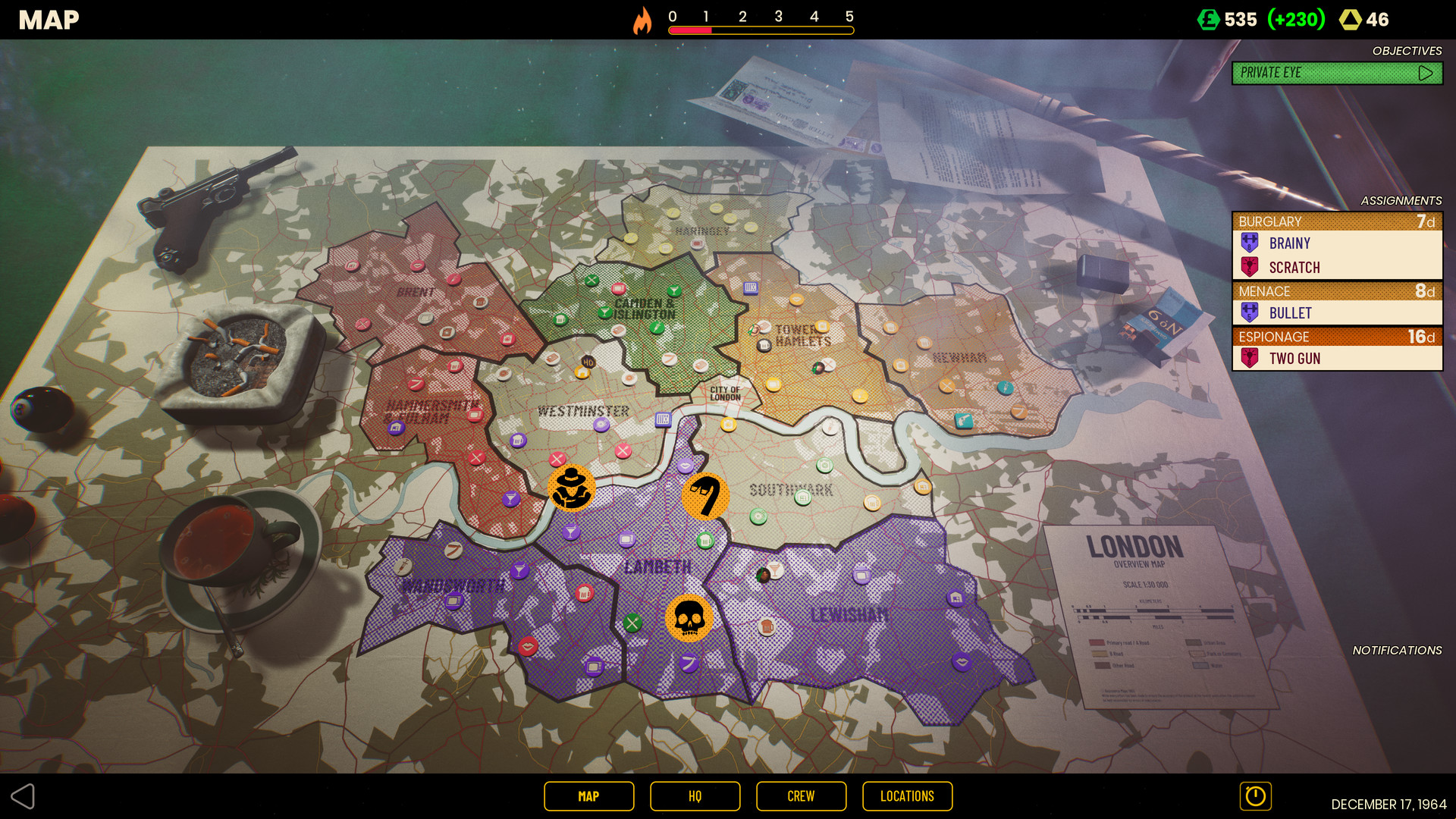
With its setting of a crime-infested 1960s London and its nature as a turn-based tactics game with management elements, Company of Crime has quite a bit to draw people in right off the bat, but it’s doing some really interesting things beyond the surface level as well- such as allowing you to play two campaigns, one each for the police and criminals, each with different progression mechanics, missions, objectives, and more. That’s an immediately compelling idea on paper, and if executed well, it can be even more so. Obviously then, we’re quite intrigued by the premise of this game, and so, to learn more about it and what it will entail, we recently sent across some of our questions about it to its developers at Resistance Games. You can read our full interview with creative director Jussi Autio below.
"For us it’s very clear that we’re doing an adaptation of history, not a historical simulation."
What sort of a balance does Company of Crime strike between the historical fiction approach and telling a story completely of its own, given its setting?
For us it’s very clear that we’re doing an adaptation of history, not a historical simulation. History does play a big important role as the setting itself is very recognizable and we want the game to be also as recognizable as possible – that London in 1960s feel like London in 1960s. And it was one of the worst eras of organized crime. However already these two things are in conflict with any desire to be a historical simulation. Mods, lemonheads, rockers, rude boys, and others are very visual icons of the era, almost to the extent of Sean Connery’s Bond films, Morris Minis and miniskirts.
The criminal legends our game is based on are slightly less well known, but still at the very core of our game. But if we went for historical simulation then the game would lose its 1960s touch – because the criminals of the time dressed in an old-fashioned way and when you spend your time building or destroying criminal empires – it would not look 1960s London at all, but something older. A lot of gangsters in old-fashioned suits… So, we are okay with making hippies and mods and rockers unit classes in the game and therefore part of the organized crime (which they weren’t) where only the boss units look like the traditional gangsters.
This doesn’t mean we’d take history only as a side note. We want the game to feel authentic, but authentic on a wider scale. This rule of thumb is easier to explain now when the game is ready to launch than it was during the development. Some things were easy of course like the fact that we call skinheads lemon heads because they hadn’t yet become the racists they’re known as nowadays and shared black Caribbean immigrants’ fondness for ska music. Therefore, lemon heads and rude boys are often found in the same criminal gangs. But other things were harder – like the subplot that goes underneath players progression. Should it tie together with the Troubles or would that change the tone of the game to too serious? We’re not going for Austin Powers, but rather a Guy Richie-feel, so involving IRA in the subplot – is that a good idea or not? There are remnants of this discussion in the game, but at in quite a changed state.
I imagine being able to play through the entire game from both sides – which are essentially polar opposites of each other – must introduce a lot of variety and replayability to the game. What should players expect in that area?
The two big differences between the two campaigns is how the progression works and how the tactical missions play out. In criminal campaigns, the progression basically means you get first some businesses under your protection, you coerce ownership some of them to unlock new stuff, and expand to new areas – face other criminal gangs and try to beat them and get more businesses to unlock more stuff.
The police campaign is more reactive. You need to place your sergeants to find out suspicious locations and sometimes the AI is conducting crime there, so when you find criminal activity, you can do stakeout missions. But the ultimate thing on the police side is that you a) want to find out suspicious locations, b) find out who owns it (in other words, is the owner a victim of extortion or part of criminal families?), and c) you want to gather evidence against the criminal families so you can raid their place and make them “civilian owned”. This means you will have to wait, place sergeants carefully, increase safety in the area, and strike only when you have enough evidence. On the criminal side you can progress more easily whenever you feel like you’re strong enough.
On tactical missions, criminals have to worry about the heat – the measurement when police are called. And if police are called, they have to collect any items they’ve dropped during the mission, so police won’t have a clue who was there. Or maybe they have a clue, but not hard evidence, at least. And when playing the police side, the missions take place when crime is already on-going. So you’re often coming to places where either two criminal families are fighting one another or beating civilians to paying protection money. While you don’t have heat or evidence to worry about, your main targets are the boss units, as arresting those helps you bring down organized crime. And you can’t be the first one to shoot, and if you kill unarmed or lightly armed criminals, you’ll get punished.
"It’s the cultural capital of the world in the 1960s – even the worst criminals can’t go around killing people, or their underworld careers would come to a fast end."
How much does playing through the game as a criminal differ from playing through it as a Scotland Yard officer? Other than the story itself, will the experiencing of playing as them be different in terms of gameplay as well, with things such as progression, abilities, and the like?
Yes, indeed, the progression is completely different. As criminals, you try to get businesses under your control and that unlocks new stuff. As the police, every promotion you earn unlocks more stuff, and promotions are tied to the progression you’ve made. So criminals have more a flexible reward system – that’s also why we force player to at least start with that campaign. The police campaign lets you experience the same story from a different perspective, learn more about the subplot, and get more variation to the gameplay. But to understand the police campaign better, you need to play criminal campaign first.
How does the heat mechanic function exactly? Does Company of Crime encourage non-combative gameplay?
Non-lethal gameplay, yes. It’s the cultural capital of the world in the 1960s – even the worst criminals can’t go around killing people, or their underworld careers would come to a fast end.
Heat has basically two levels. In tactical missions, the more violent and loud you are, the more heat you accumulate. In other words, knocking someone unconscious with a knuckleduster is not so bad as stabbing someone dead with a knife. Taking out your guns causes more heat than just a brawl, and the endgame machine guns are the worst. And every time your accumulated heat crosses a threshold, the police are called. You might be able to beat the first bobbies that arrive, but attacking a police officer is a certain way to cause even more heat. So usually when someone calls the cops, you’re better off wrapping things up, trying to finish the mission or even abort at some cases.
Depending on how well or badly you did in tactical missions, you will accumulate heat on to the strategy map. And there, the more heat you have, the more police will be after you. Arresting key people, raiding your places, being faster to enter tactical missions when you’re conducting crime – those are a few key elements to heat – but the main thing is that it will end your career if you accumulate too much heat.
Some locations accumulate less heat, where gunfights are less of a worry.
Progressing through levels in Company of Crime is structured is very interesting, with collection of evidence, for instance, being an important part of the process after you’ve committed a crime. Can you speak more about that, and how much of what players do in that stage affects things going forward?
Collecting evidence will indeed change the dynamics in a mission quite a bit. This is quite typical in mid- to end-game situation: You attack your rival gang to earn respect among the citizens so you can perform coerce ownership missions in the new area you’re expanding to. The point is just to beat them up, but then you’re winning, and the enemy takes out the guns and a brawl turns in to a gunfight. You can leap forward to try and disarm the enemies, take cover and start shooting yourself, or abort. You’re doing one or the other and the police are called. You fail to wrap up in time and the police arrives, and then the game reveals where your units have dropped items that would work as evidence against you. So now you’re in a hurry to finish your mission – just that one last guy somewhere, but you also have to hurry back to unconscious enemies where you dropped your wallet before the police arrests you.
So basically, if you leave behind evidence, it equals to having accumulated a lot of heat and having several police groups arrived at the scene.
In a police raid on a criminal place, you (as a criminal) either have to collect the evidence that reveals your wrongdoings (book keeping, drugs, etc) and burn it or flush it before the cops arrest you, or (as police) prevent the criminals from doing that. That dictates if criminals lose the location or not, so even getting your unit arrested and temporarily out isn’t as bad as leaving that evidence to the cops.
"If the game sells well, we have made sure it works on controllers, so expanding to other platforms is another one of our future hopes for the project."
How much flexibility and depth does Company of Crime offer in its management side of the gameplay?
It’s difficult to give any concrete depth value, but it’s doing all right. There are system driven games and there are design driven games. The first is where system simulation aims to create meaningful content in itself – that code bits collide with other code-bits and provide meaningful outcomes. The latter is were mechanics are more designed to create desired feeling of the game world, but that you can’t vary as endlessly as system driven games. System driven games are more time consuming to make and to balance. Our philosophy has been to design the mechanics so that it feels right, but it won’t be endlessly replayable. We hope that if the gamers find our game in large enough proportions, we could expand the experience with additional content, but at the moment those are plans that we keep at the back of our mind.
Roughly how long will an average play through of Company of Crime be?
12-20 hours per campaign, depending on the difficulty level a bit. The criminal campaign is longer than the police campaign.
Why did you decide to launch as a PC exclusive?
Strategy games are biggest in the PC space, so that is an obvious choice. Our team has only limited experience with console development, so it was easier to propose the game as PC first. If the game sells well, we have made sure it works on controllers, so expanding to other platforms is another one of our future hopes for the project.
Do you have any plans to launch on the Switch or any of the other current-gen consoles?
No plans, but plenty of hopes and wishes.
Given that next-gen consoles are right around the corner, have you given any thought to next-gen ports for the game?
No, not yet.

















